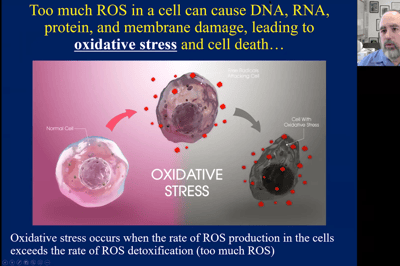AMAZING natural health products backed by research
Leading Research on Tocotrienol
Discover the research-backed therapeutic potential of tocotrienol for various health conditions and overall well-being.
Research on Tocotrienol Supplementation
Exploring the therapeutic potential of tocotrienol for oxidative stress, cardiovascular health, cancer, neurodegeneration, bone health and supplementation for overall health improvement.


15+
Health Benefits
300+
Evidence-Based Research
A. Protect Your Brain - Now!
1. "Tocotrienol: The Natural Vitamin E to Defend the Nervous System?"
by Chandan K. Sen, Savita Khanna, and Sashwati Roy
This study explores the unique neuroprotective properties of tocotrienols, a distinct form of Vitamin E. The study highlights tocotrienol’s superiority over tocopherols in protecting the nervous system, particularly in combating oxidative stress and excitotoxicity, which can damage neurons. This protection is not solely due to antioxidant effects but also involves tocotrienol's influence on specific molecular targets in the neuron, notably c-Src kinase and 12-lipoxygenase. These enzymes are critical in neural cell signaling and inflammation pathways, and tocotrienol’s action on them helps reduce neuron death.
The research further demonstrates that orally supplemented tocotrienols can cross the blood-brain barrier, reaching effective concentrations in the brain, which is significant for neuroprotection and suggests potential applications for treating neurodegenerative diseases. Compared to tocopherol, tocotrienols show multi-fold increased potency in protecting neurons at very low (nanomolar) concentrations. Based on these findings, the authors recommend further exploration into tocotrienols for clinical applications related to neurodegenerative and neuroinflammatory diseases.
This study emphasizes the importance of tocotrienols as a potentially valuable form of Vitamin E, particularly in contexts where neuroprotection is crucial, and supports the broader therapeutic potential of tocotrienol supplementation for nervous system health
https://pubmed.ncbi.nlm.nih.gov/15753140/
2. Tocotrienols: The Unsaturated Sidekick Shifting New Paradigms in Vitamin E Therapeutics
(Kanchi et al., 2017)
This paper emphasizes the emerging therapeutic value of tocotrienols within the vitamin E family, which traditionally focused on tocopherols. The authors provide evidence supporting tocotrienols’ potential in treating cancer, metabolic syndrome, cardiovascular diseases, and neurodegenerative conditions. They explore tocotrienols’ ability to penetrate tissues more effectively due to their unsaturated side chains, allowing for better bioavailability in cell membranes. The review suggests that tocotrienols may become vital in clinical settings for their neuroprotective, anti-cancer, and cardioprotective properties, promoting them as a promising therapeutic option for various chronic diseases.
https://pubmed.ncbi.nlm.nih.gov/28789906/
3."An Interactive Review on the Role of Tocotrienols in Neurodegenerative Disorders"
by Ruth Naomi et al., published in Frontiers in Nutrition in October 2021.
Methodology
This review synthesizes findings from various in vitro and in vivo studies on the neuroprotective effects of tocotrienols (T3s) on neurodegenerative diseases, specifically Alzheimer’s disease (AD) and Parkinson’s disease (PD). The authors explored studies that examined T3s’ antioxidant properties, mitochondrial protection, and ability to reverse neurodegeneration.
Findings
Antioxidant Effects: Tocotrienols, especially α-T3 and γ-T3, show significant antioxidant activity in brain tissues, which helps mitigate oxidative stress. Studies highlight that T3s enhance the activity of enzymes like superoxide dismutase (SOD) and catalase (CAT), reducing reactive oxygen species (ROS) and preventing lipid peroxidation in AD and PD models.
Mitochondrial Protection: T3s serve as a protective shield against mitochondrial dysfunction, a known contributor to both AD and PD. They help maintain mitochondrial integrity and prevent apoptosis by reducing mitochondrial lipid peroxidation and improving mitochondrial respiration.
Neuroprotective Mechanisms: T3s promote cell signaling pathways, particularly the PI3K/Akt pathway, which provides neuroprotection by enhancing cellular repair and inhibiting pro-apoptotic signals. They also inhibit pathways that contribute to neurotoxicity, including glutamate excitotoxicity in AD.
Anti-inflammatory Properties: Tocotrienols exhibit anti-inflammatory effects by downregulating inflammatory markers like TNF-α and caspases, potentially reducing neuroinflammation in AD and PD.
Effects on Specific Neurodegenerative Processes: T3s reduce protein aggregation (amyloid-beta in AD and α-synuclein in PD), which is crucial in slowing disease progression.
Conclusion and Recommendations
The review concludes that tocotrienols have potential as therapeutic agents for AD and PD, offering protective effects through multiple mechanisms. However, clinical trials are still needed to validate these effects in humans. The review recommends further research into the bioavailability of T3s, as oral formulations may have limited absorption. Additionally, it suggests developing T3-based supplements for preventive and therapeutic purposes, with emphasis on overcoming high extraction costs and bioavailability challenges.
This review emphasizes tocotrienols as promising agents for neurodegenerative disease management, advocating for more extensive research and clinical validation.
https://www.frontiersin.org/journals/nutrition/articles/10.3389/fnut.2021.754086/full
4. Vitamin E therapy beyond cancer: Tocopherol versus tocotrienol
(Peh et al., 2016)
This review discusses the differences between tocopherols and tocotrienols, both forms of vitamin E, with a focus on their distinct therapeutic potentials. Tocotrienols exhibit stronger antioxidant and anti-inflammatory properties compared to tocopherols and have unique mechanisms, such as the inhibition of HMG-CoA reductase, which lowers cholesterol levels and mitigates inflammation by downregulating NF-κB activation. The authors highlight that tocotrienols offer radioprotective benefits and may be more effective in conditions beyond cancer, including cardiovascular,neurological, and bone health. The study concludes that tocotrienols should receive more clinical attention and research focus due to these benefits
https://pubmed.ncbi.nlm.nih.gov/26706242/5
5. YouTube “Oxygen, Stress, and Antioxidants"
Ron Mittler, PhD, MU Health
“ROS/oxidative stress are associated with most/all diseases?”




Top Blue line = Dementia (Women) Second is Dementia (Men)
Source: Australian Bureau of Statistics (ABS) 2022, Australian Institute of Health and Welfare (AIHW) Deaths in Australia
B. Revisiting the therapeutic potential of tocotrienol
Ranasinghe, Ranmali, Mathai, Michael and Zulli, Anthony (2022) Revisiting the therapeutic potential of tocotrienol. BioFactors. ISSN 0951-6433
Review of the Report
The research report from Victoria University explores the therapeutic potential of tocotrienol, a member of the vitamin E family, highlighting its distinct advantages over tocopherols. The report emphasizes tocotrienol's superior antioxidative properties and its role in various health benefits.
Who Should Consider Taking Tocotrienol: Individuals who may benefit from tocotrienol supplementation include:
Those at Risk for Cardiovascular Diseases: Tocotrienol has shown significant benefits in reducing cholesterol levels and improving heart health.
Individuals with Metabolic Syndrome: Due to its positive effects on lipid profiles and glucose metabolism.
Cancer Patients or Those at High Risk: Tocotrienol exhibits potent anti-cancer properties.
Individuals with Neurodegenerative Conditions: The antioxidant properties may help in protecting against neurodegeneration.
People with Bone Health Concerns: It aids in maintaining bone density and health.
Benefits of Tocotrienol: Based on the findings in the report, the benefits of tocotrienol include:
Antioxidant Effects: Tocotrienol provides superior antioxidant protection compared to tocopherols, effectively scavenging free radicals and protecting cells from oxidative damage.
Cardiovascular Health: Tocotrienol helps in reducing total and LDL cholesterol, potentially lowering the risk of atherosclerosis and other cardiovascular diseases.
Cancer Prevention and Therapy: Tocotrienol has demonstrated anti-cancer properties, including the ability to induce apoptosis in cancer cells and inhibit tumor growth.
Neuroprotection: Its neuroprotective effects are beneficial in conditions like Alzheimer's disease, where oxidative stress plays a crucial role.
Bone Health: Tocotrienol supports bone health by promoting bone formation and reducing bone resorption, making it beneficial for preventing osteoporosis.
Anti-inflammatory Effects: It helps in reducing inflammation, which is beneficial in managing chronic inflammatory conditions.
Conclusion: The research underscores the significant therapeutic potential of tocotrienol, suggesting it as a valuable supplement for various health conditions, particularly those related to oxidative stress, cardiovascular health, cancer, neurodegeneration, and bone health. Individuals at risk for these conditions or those looking to improve their overall health should consider tocotrienol supplementation based on these findingings.
This summary is based on the detailed examination of the document "Revisiting the therapeutic potential of tocotrienol" from Victoria University. For specific dosage and personalized recommendations, consulting a healthcare provider is advised.
C. An Update on Vitamin E, Tocopherol and Tocotrienol— Perspectives
Maria Laura Colombo
Department of Drug Science and Technology, University of Torino, via Pietro Giuria 9, 10125 Torino, Italy; E-Mail: marialaura.colombo@unito.it.
Received: 6 February 2010; in revised form: 15 March 2010 / Accepted: 23 March 2010 / Published: 24 March 2010
Link to report: 463210_early_in_press.pdf
Link to report: https://www.mdpi.com/1420-3049/15/3/2103
Review of Report
The document is a review article titled "An Update on Vitamin E, Tocopherol, and Tocotrienol—Perspectives" published in Molecules in 2010. It discusses the chemical nature, biological roles, and potential health benefits of the different forms of Vitamin E, specifically tocopherols and tocotrienols.
Key Findings:
Chemical Differences:
Tocopherols and tocotrienols are both forms of Vitamin E, but they differ in their chemical structure. Tocopherols have a saturated phytyl tail, while tocotrienols possess an unsaturated farnesyl tail. This structural difference impacts their solubility and interaction with cell membranes.
Biological Activity:
Tocotrienols exhibit unique biological activities that are often not observed with tocopherols. For example, tocotrienols have potent neuroprotective, anticancer, and cholesterol-lowering effects.
Tocopherols, particularly α-tocopherol, have been more extensively studied due to their abundance in the human diet and body. However, emerging research suggests that the non-α-tocopherol forms of Vitamin E (including tocotrienols) have distinct and sometimes more potent effects.
Neuroprotection:
At nanomolar concentrations, α-tocotrienol, but not α-tocopherol, can prevent neurodegeneration. This suggests a specific role for tocotrienols in protecting the brain against oxidative stress and related damage.
Cardiovascular Health:
Tocotrienols, but not tocopherols, have been shown to inhibit cholesterol synthesis by suppressing the enzyme HMG-CoA reductase. This effect is similar to how statins work, suggesting tocotrienols could be beneficial in managing cholesterol levels.
The document references studies indicating that tocotrienol supplementation can improve arterial compliance, which is a predictor of cardiovascular events.
Antioxidant Activity:
Both tocopherols and tocotrienols act as antioxidants, neutralizing free radicals and preventing lipid peroxidation. However, tocotrienols may have a broader spectrum of antioxidant effects.
Cancer:
Tocotrienols have been shown to possess anticancer properties, such as inhibiting tumor cell proliferation and inducing apoptosis (cell death) in cancer cells. These effects are more pronounced than those observed with tocopherols.
Summary:
The review highlights the significant differences between tocopherols and tocotrienols, particularly emphasizing the unique and potent biological effects of tocotrienols. Tocotrienols show promise in areas like neuroprotection, cholesterol management, and cancer prevention, which are less pronounced or absent in tocopherols. The review suggests that while tocopherols have been the focus of much research, tocotrienols may offer additional health benefits, particularly in preventing and managing neurodegenerative diseases, cardiovascular conditions, and certain types of cancer.
